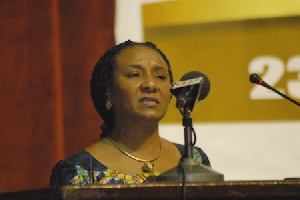 Mona Quartey, Deputy Minister of Finance
Mona Quartey, Deputy Minister of Finance
The call for the promulgation of a mineral revenue management law is relevant because it will guarantee more efficient management and use of revenues from the mining industry, Mrs. Mona Quartey, Deputy Minister of Finance has said.
Moreover, she said it would enhance transparency and accountability in the management of the country’s mineral revenue inflows.
Mrs. Quartey was speaking at the Ghana Extractive Industries Transparency Initiative (EITI) dissemination workshop held for parliamentarians in Koforidua.
EITI, which was adopted in Ghana in 2013, aims at improving transparency and accountability in the management of the country’s natural resources.
In particular, EITI reduces the potential negative impacts of mismanaged resources by ensuring that revenues become an important source of long-term economic growth that will contribute to sustainable development and poverty reduction.
She assured of government’s commitment to making sure that extractive revenues were utilised in the most efficient and effective manner.
Mrs. Quartey said Ghana was making a steady impact towards greater transparency in the extractive sector by making revenue information on the extractive sector available to the public.
She said EITI had made substantial achievements by increasing transparency in the mining and oil and gas sector revenue stream through publication and public discourse on revenue received by the government and payment made by companies.
The deputy minister said the call for the improvement of the management of the extractive sector presents a unique opportunity to all, especially parliament, to establish itself as a relevant and credible actor in the movement towards greater transparency, accountability and responsiveness in government.
“There is a critical need to strengthen the link between transparency, accountability and overall development of our country with innovative strategies that speak to our peculiar situations,” she stressed.
Mrs. Quartey said the country’s legislature had played a robust role in creating a viable oversight mechanism but could do more to monitor the collection and the use of revenues from the extractive industry by passing the right laws.
“Parliament can also ensure the ratification of agreement which are mutually beneficial to the country and investors,” she added.
Ben Aryee, an Advisor at the Ministry of Lands and Natural Resources said the ministry was committed to implementing EITI from the inception because it was geared towards improving transparency and accountability in the management of revenue from natural resources as a tool to facilitate the use of such revenues to promote sustainable socio-economic development.
He said the mining industry employs 32,000 people in large-scale mining sub-sector and over one million in small mining, contributing an average of 40 percent of government revenue and about 17.5 percent of Ghana’s total corporate earning tax.
Mr. Aryee said for EITI to succeed as a tool in the management of extractive mining, oil and gas industries, there was the need for parliament to play effective role in carrying out its core functions of regulatory and institutional oversight, representation and critical law making.
“This is because parliament is the only public oversight institution with the constitutional mandate to oversee the implementation of policy by government, scrutinising public expenditures, influence and shape policy through the law-making processes and present citizens concerns and need in decision making,” he added.
Mr. Aryee assured the ministry’s support for the EITI reforms to ensure that the extractive sector revenues due government were paid by the operators and government in turn utilised the transparency and accountability to achieve development in most efficient and effective manner.